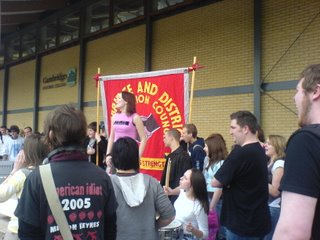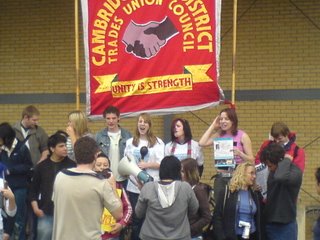Wow! What a night.
Respect breakthrough in East London,
Nazis gain in Barking through Hodge's self-fulfilling prophecy,
Labour melt down almost everywhere. Having been been occupied with a funeral and a birthday party, this is the first chance to properly reflect on the results, so here goes.
The Respect result is definitely very good. We've opened up new areas, and turned what we knew was a base of support into concrete political gains. The Tower Hamlets results are really encouraging, we're the main opposition to New Labour on the council, and came very close to taking away their majority. Congrats to all our new councillors, and commiserations to all those who I know would have made excellent councillors who just missed out. This election, however, will rumble on, and on, and on, thanks to the allegations of fraud and abuse of power. If we can overturn the ruling in St. Katharine's ward and focus resources there we might yet wipe out Labour's majority.
I'm glad to see we got a decent showing in Newham. 3 councillors might sound like a poor return considering we stood throughout the ward, but when you breakdown the vote it's really encouraging. We clinched 26% of the vote, which gave us only 5% of the council. More an indictment of the first past the post system than a sign of our limited success. Our Mayoral candidate also clinched over 10,000 first preferences, which was impressive.
Add in Salma Yaqoob's storming victory in Birmingham and you have a net gain of 15 councillors. The BBC prefer, still, to highlight UKIP's 1, and relegate us to simply another 'other'.
Those are the Respect wins, but it's worth looking a bit deeper into the results round the country. There are a number of relative success stories: Jerry Hicks came a strong second in Bristol Lockleaze, beating Labour in what was largely a white working class area. We came within 7 votes of gaining another councillor in Preston Town Centre.
In Liverpool, in a campaign I wish i could have got more involved in, Paul Deeson polled 281 votes in Prince Park. This is the heart of Toxteth, an area that has suffered from years of neglect, and I'm proud that Respect chose it as an area to stand. Paul's result, beating the greens and the tories, is impressive, and at least potentially the start of something. Liverpool desperately needs a choice other than Yellow privatisation or Red Privatisation, and I don't see anyone else providing it but Respect.
Finally the Fascists. They did far too well. They'll probably embarass themselves like they always do, but you can hardly tell that to the victim of a racist attack on the streets of Barking. I think them doing well was predictable, but I fear Margaret Hodge's statements, no matter how intended, had the affect of making them seem like a legitimate protest vote, and they loved it. Depressingly one of the best comments I've heard about it was from Michael Portillo. Unlike the rest of the tories, who now love the fact they can claim immigration as a legitimate political issue, he made it clear that there is no excuse for voting for Nazis. He's right, there's not. We can try to explain it, and we will, but we can't excuse it.




